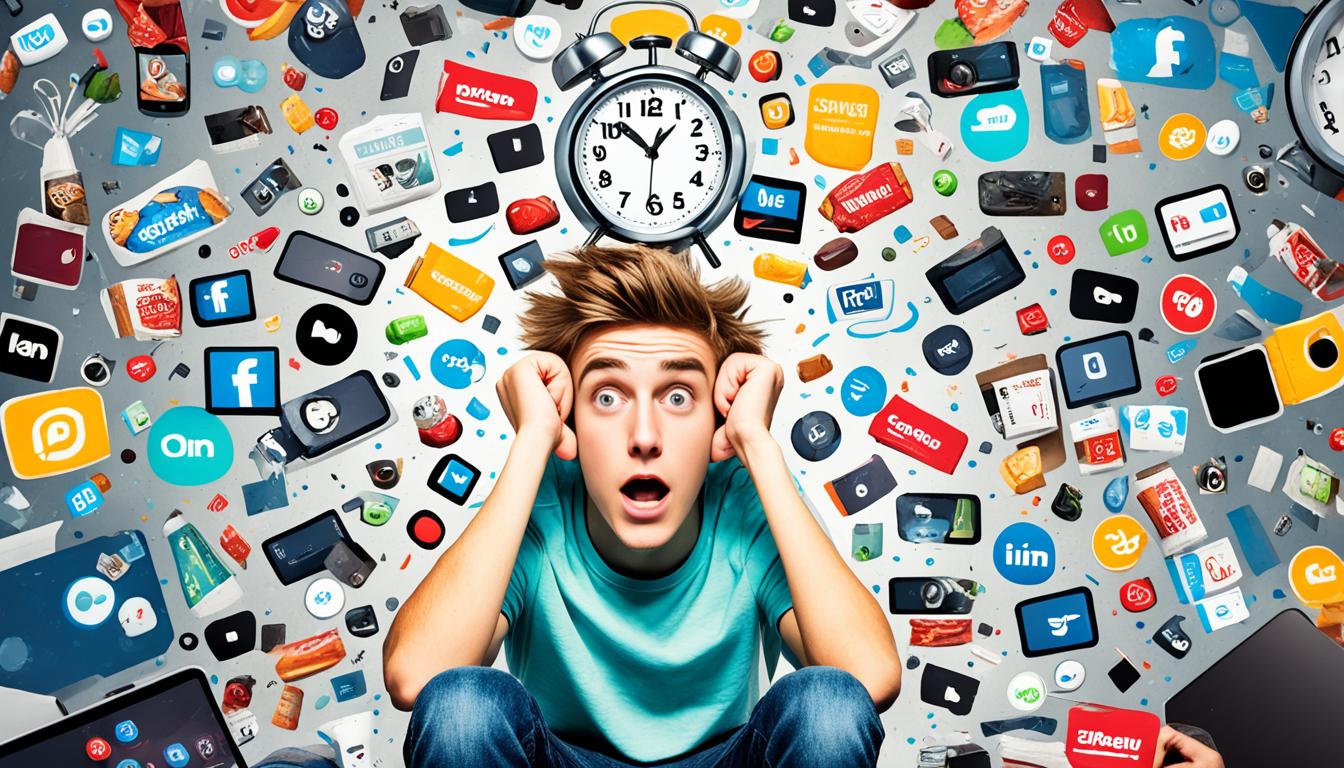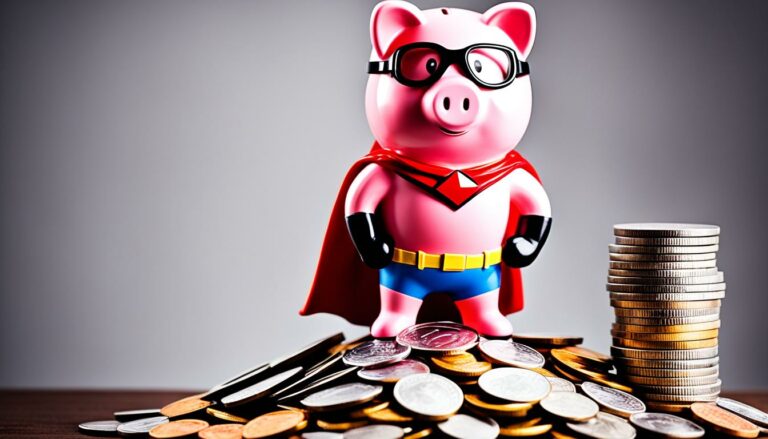Dangers of Social Media for Teens Explained
Social media has become an integral part of many teenagers’ lives, offering a platform for self-expression, connection with others, and access to a vast array of information. While there are undoubtedly benefits to social media use, it is essential to be aware of the potential dangers it can pose to adolescents.
Research has shown that excessive social media use among teens can have negative effects on their mental health. Factors such as the content they consume, the amount of time spent online, and individual circumstances can all influence the impact of social media on teenagers.
Some of the potential dangers that teenagers may face on social media include:
- Distractions from important activities
- Disrupted sleep patterns
- Exposure to biased or incorrect information
- Spread of rumors and personal information
- Unrealistic body and lifestyle expectations
- Online predation and cyberbullying
- Potential for self-harm
It is worth noting that not all studies have found a significant link between social media use and mental health risks in teens. However, it is crucial to remain vigilant and informed about the potential dangers to ensure the well-being of teenagers in their online interactions.
Key Takeaways:
- Excessive social media use can have negative effects on teenagers’ mental health.
- Factors such as content, time spent online, and individual circumstances influence the impact of social media on teens.
- Dangers of social media for adolescents include distractions, exposure to biased information, cyberbullying, and potential for self-harm.
- Not all studies have found a significant link between social media use and mental health risks in teens, but it is important to remain vigilant.
- Parental guidance, communication, and education are key to helping teenagers navigate the potential dangers of social media.
Positive Effects of Social Media for Teens

Social media platforms offer numerous benefits for teenagers, promoting healthy socialization, providing support, and facilitating self-expression. These platforms serve as online networks that allow teens to connect with like-minded individuals and foster a sense of belonging.
The ability to connect with others who share common interests is particularly advantageous for teenagers who may lack social support offline or have long-term medical conditions. Social media bridges geographical barriers, enabling teens to form relationships and find support from individuals around the world.
Moreover, social media provides a platform for learning and coping. Teenagers can observe how others navigate challenging life situations, openly discuss their mental health struggles, and share valuable coping mechanisms. By witnessing these experiences, teens can develop their own strategies for overcoming difficulties, enhancing their resilience and emotional well-being.
Moderated chat forums on social media platforms also play a vital role in supporting teenagers’ mental health. These forums provide safe spaces where teens can seek help for symptoms of mental health conditions, ask questions, and receive guidance from professionals or individuals with similar experiences. The sense of community and understanding fostered in these forums can alleviate feelings of isolation and empower teens to seek the help they need.
Ultimately, social media’s positive effects on teenagers encompass opportunities for healthy socialization, support, expression, learning, and coping. By harnessing the potential of social media, teenagers can navigate the challenges of adolescence and cultivate a sense of belonging, resilience, and well-being.
Benefits of Social Media for Teens:
- Opportunities for healthy socialization and connections
- Support from online networks for those lacking offline social support
- Platform for self-expression and personal growth
- Access to learning resources and coping mechanisms
- Moderated chat forums for seeking help with mental health concerns
“Social media helps me connect with people who understand what I’m going through, and it’s reassuring to know I’m not alone in my struggles.” – Emma, 17-year-old social media user
Negative Effects of Social Media for Teens
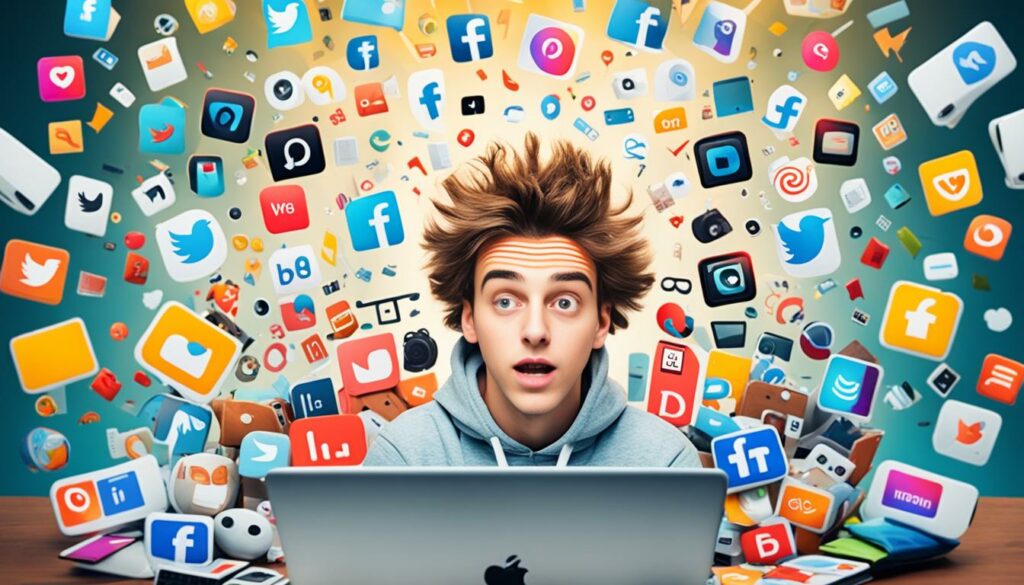
Excessive use of social media can have detrimental effects on the well-being of teenagers. It can lead to distractions and disruptions in their daily lives, diverting their attention from important tasks such as homework, exercise, and family activities. The constant engagement with social media platforms can prevent teenagers from fully engaging in real-world experiences and developing meaningful relationships offline.
One of the major concerns of social media is the exposure to risky content. The content on social media platforms is vast and unregulated, making it easier for teenagers to stumble upon inappropriate or harmful material. This includes explicit or violent content, misinformation, rumors, and unrealistic body and lifestyle expectations. Such exposure can negatively impact their mental health and contribute to the development of anxiety, depression, and low self-esteem.
Social media platforms also facilitate the spread of self-harm and negative posts. Teenagers may come across content that promotes self-harming behaviors, eating disorders, or other harmful activities. This can have a profound impact on vulnerable individuals and potentially lead to further mental health issues.
Sharing personal information online poses significant risks for teenagers. Cyberbullying is prevalent on social media platforms and can have devastating consequences for the mental well-being of teenagers. The constant exposure to negative comments, harassment, and online rumors can severely impact their self-esteem and mental health. Moreover, sharing personal information such as location, school, or contact details can make teenagers vulnerable to online predators or identity theft.
It is crucial to recognize the mental health risks associated with excessive social media use and take proactive steps to mitigate them. By fostering open communication and providing education on responsible social media use, parents and guardians can help teenagers navigate the online world safely while prioritizing their mental well-being.
Impact of Social Media Use on Teenagers’ Mental Health
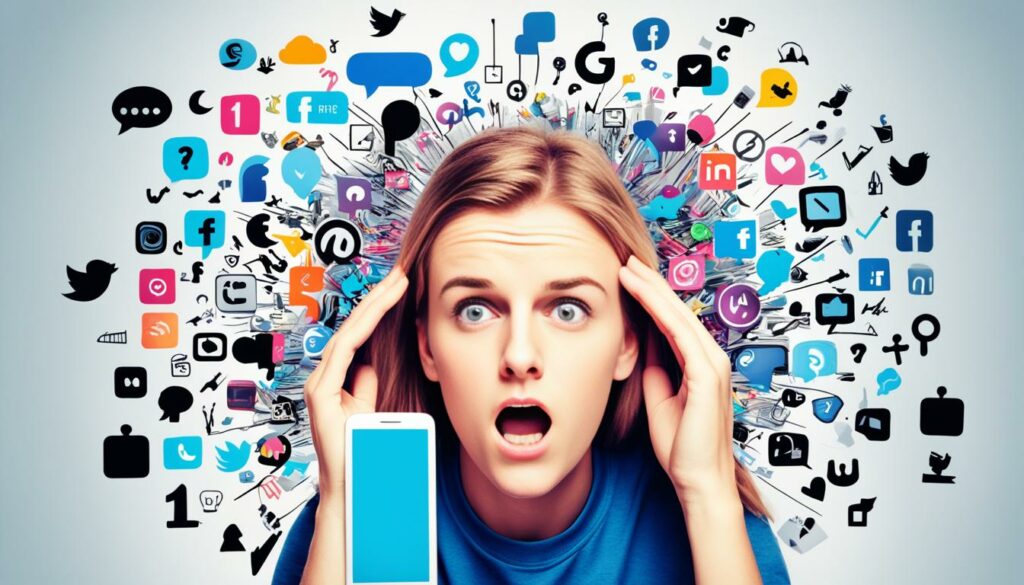
Excessive use of social media can have a significant impact on teenagers’ mental health. Research suggests that spending more than three hours a day on social media is associated with an increased risk of mental health concerns.
The time spent on social media platforms is a crucial factor in determining its impact on mental well-being. Teenagers who spend excessive amounts of time online may neglect important activities such as schoolwork, physical exercise, and social interactions in the real world. This can lead to feelings of isolation, lack of motivation, and increased stress levels.
Furthermore, the type of content consumed on social media can also affect teenagers’ mental health. Exposure to content depicting illegal activities, self-harm, disordered eating, and discrimination can elevate the risk of mental health issues, particularly for teenagers who already have preexisting conditions.
“Social media is like a double-edged sword. It can connect us with others, but it can also expose us to content that negatively impacts our mental health. It’s important for teenagers to be mindful of what they consume and how much time they spend on social media.” – Dr. Samantha Evans, Child Psychologist
Not only can the content on social media platforms affect mental well-being, but certain negative posts or interactions can also have severe consequences. In rare cases, social media has been linked to self-harm and even death. It is crucial for parents, friends, and educators to be aware of the potential risks associated with excessive social media use and collaborate in promoting a safe and supportive online environment.
Key Points:
- Spending more than three hours a day on social media increases the risk of mental health concerns in teens.
- The impact of social media on mental health depends on the type of content consumed.
- Exposure to content depicting illegal acts, self-harm, disordered eating, and discrimination can elevate mental health risks.
- Negative posts or interactions on social media have been linked to self-harm and even death.
Risks of Social Media Use for Teens
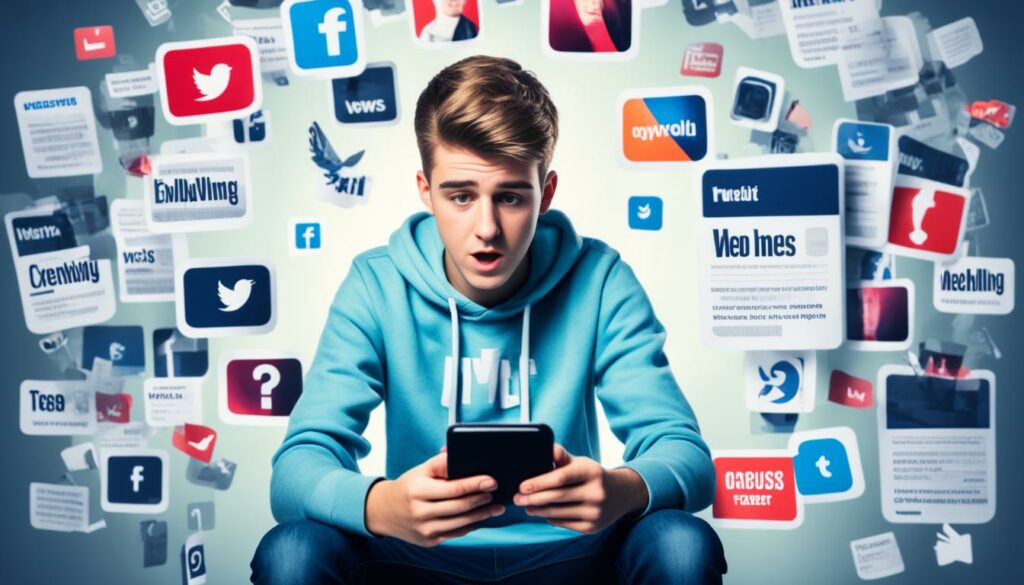
When it comes to social media use, teenagers face a variety of risks that can impact their well-being. These risks are influenced by factors such as the amount of time spent on social media, the type of content they are exposed to, and their personal circumstances. It’s important for parents and guardians to be aware of these risks and take steps to mitigate them.
Exposure to Discriminatory Content
One of the risks associated with social media use is the exposure to discriminatory content. Hate speech, racism, and other forms of discrimination can be prevalent on social media platforms, and teenagers may encounter harmful and offensive content. This exposure can negatively affect their mental health, leading to increased anxiety and depression.
Stress Posting and Impulsive Sharing
Teenagers often use social media as an outlet for their emotions, leading to stress posting. When they are angry or upset, they may impulsively share content without considering the potential consequences. This behavior can result in conflicts, misunderstandings, and damaged relationships, causing additional stress and anxiety.
Vulnerability to Online Predators
Another significant risk for teenagers on social media is the potential for exploitation by online predators. Sharing personal information, such as location or details about daily routines, can make teenagers vulnerable to predators seeking to manipulate or harm them. It’s crucial for teenagers to be cautious and mindful of the information they share to protect their safety.
Sharing Sexual Photos and Personal Information
Some teenagers engage in risky behaviors on social media, such as sharing sexual photos or divulging highly personal information. This behavior can have severe consequences, including cyberbullying, harassment, and potential exploitation. It’s important for parents to educate their teenagers about the potential dangers of such actions and encourage responsible online behavior.
Risks of Social Media Use for Teens
| Risks | Impact |
|---|---|
| Exposure to Discriminatory Content | Increased risk of anxiety and depression |
| Stress Posting and Impulsive Sharing | Conflicts, damaged relationships, and heightened stress |
| Vulnerability to Online Predators | Risk of manipulation, harm, and exploitation |
| Sharing Sexual Photos and Personal Information | Cyberbullying, harassment, and potential exploitation |
It’s essential for parents to closely monitor their teenagers’ social media activity, promote responsible online behavior, and educate them about the potential risks. By staying informed and being proactive, parents can help protect their teenagers from the negative impacts of social media.
Tips for Parents to Manage Teen’s Social Media Use
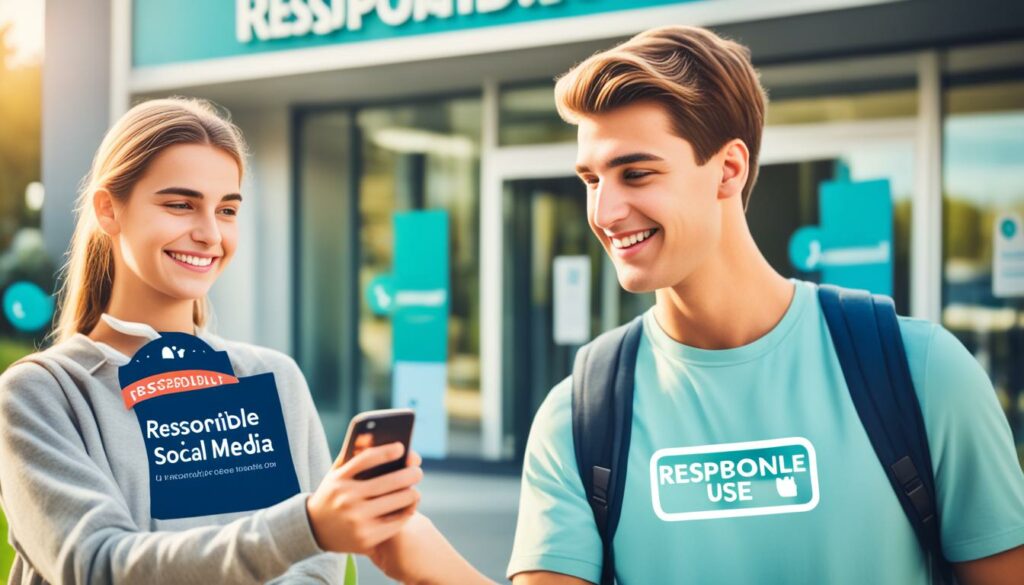
Parents play a crucial role in helping teenagers navigate the world of social media responsibly and minimize its potential negative effects. By implementing these tips, parents can create a safe and healthy digital environment for their teens.
1. Set Rules and Limits
Establish clear rules and boundaries regarding social media use. Discuss expectations with your teenager and set guidelines regarding the amount of time they can spend on social media each day and when and where they can access it. Encourage them to prioritize important activities such as homework, physical activity, and face-to-face interactions with friends and family.
2. Monitor Their Accounts
Regularly monitor your teenager’s social media accounts to ensure their online activity is safe and appropriate. Be familiar with the platforms they use and the content they engage with. Consider using parental control software or privacy settings to manage their access and limit exposure to harmful or sensitive content.
3. Foster Regular Communication
Encourage open and honest communication with your teenager about their social media experiences. Create a safe space for them to share any concerns or challenges they may be facing online. Actively listen, provide guidance, and address any issues that arise. Regularly check in with them about their online interactions and experiences.
4. Be a Role Model
As a parent, your actions speak louder than words. Be a positive role model by demonstrating responsible social media use yourself. Show your teenager how to engage in healthy and respectful online interactions. Avoid oversharing personal information and demonstrate the importance of maintaining privacy and digital safety.
5. Teach Online Safety
Educate your teenager about the importance of online safety and privacy. Teach them to protect their personal information, avoid sharing it with strangers, and be cautious of online predators. Emphasize the potential risks and consequences of engaging in risky behaviors online.
“Parents play a crucial role in helping teenagers use social media responsibly and minimize its negative effects.”
By following these tips, parents can guide their teenagers towards responsible social media use. Open communication, setting boundaries, and teaching online safety are essential in ensuring that social media has a positive impact on their well-being.
Benefits of Setting Rules and Limits
| Benefits | Explanation |
|---|---|
| Improved Time Management | Setting limits helps teenagers prioritize important activities in their lives, such as academics and physical fitness. |
| Reduced Exposure to Harmful Content | Setting rules allows parents to safeguard their teenagers from inappropriate or harmful content on social media platforms. |
| Promotes Healthy Sleep Habits | Limiting social media use before bedtime can improve sleep quality and prevent sleep disruption. |
| Enhanced Face-to-Face Interactions | By setting boundaries, teenagers are encouraged to engage in meaningful face-to-face interactions with their peers and family members. |
How Social Media Affects Teenage Self-esteem
Social media can have a significant impact on the self-esteem of teenagers. The constant exposure to idealized images and the temptation to compare themselves to others can lead to negative effects on their self-worth and body image. The pressure to maintain an ideal online image can be emotionally draining, causing feelings of inadequacy and insecurity.
On social media, it’s easy to get caught up in the highlight reels of others’ lives, which are often filtered and edited to portray an unrealistic image of perfection. This constant comparison can leave teenagers feeling like they don’t measure up or that they’re missing out on something. It creates an unrealistic standard that they feel they need to live up to.
Moreover, the online environment lacks the nonverbal cues and real-time interactions that are crucial for healthy social development. It can be challenging for teenagers to form authentic connections and understand social dynamics through the limited scope of social media. While interacting online, teenagers often find themselves seeking validation through likes, comments, and follower counts, further contributing to their self-esteem woes.
“Comparison is the thief of joy.” – Theodore Roosevelt
Developing a healthy self-esteem requires authentic, face-to-face interactions and building relationships based on genuine connections. It’s important for teenagers to have opportunities to consolidate their identity through real-life experiences, rather than relying solely on the online world.
| Factors Influencing Social Media’s Impact on Teenage Self-esteem | Negative Impact on Self-worth |
|---|---|
| Comparison to idealized images | Feelings of inadequacy and insecurity |
| Pressure to maintain an ideal online image | Emotional exhaustion |
| Lack of nonverbal cues and real-time interactions | Difficulty in forming authentic connections |
In conclusion, social media has the power to significantly impact teenage self-esteem. The constant exposure to idealized images, the pressure to maintain an ideal online image, and the lack of authentic connections can all contribute to negative effects on self-worth. It’s crucial for teenagers to have a balanced approach to social media and prioritize offline interactions and relationships to foster a healthy sense of self-esteem.
Pros and Cons of Social Media for Teenagers
Social media has become an integral part of teenagers’ lives, offering both benefits and drawbacks. Understanding the pros and cons of social media use can help parents and teenagers navigate this digital landscape responsibly.
Benefits of Social Media for Teens
1. Social Connection and Support:
- Teens can connect with peers who share similar interests and experiences, fostering a sense of belonging and support.
- Online communities provide a platform for teenagers to seek guidance, share concerns, and find emotional support during challenging times.
2. Opportunities for Self-Expression:
- Social media allows teenagers to express themselves creatively through posts, photos, videos, and art.
- Platforms like Instagram and TikTok enable self-discovery and self-presentation, boosting their confidence and self-esteem.
3. Learning and Exploration:
- Teenagers can access a wide range of educational content, explore different perspectives, and stay informed about current events.
- Social media platforms also offer opportunities for skill development, such as through tutorial videos and online courses.
Drawbacks and Risks of Social Media for Teens
1. Social Isolation and Comparison:
- Excessive social media use can lead to social isolation and a decrease in face-to-face interactions.
- Teens may experience feelings of inadequacy when comparing themselves to carefully curated images and lifestyles displayed on social media.
2. Distractions and Time Management:
- Spending too much time on social media can be a major distraction, affecting academic performance and other important activities.
- Constant notifications and the fear of missing out (FOMO) can lead to decreased focus and productivity.
3. Risks and Dangers:
- Cyberbullying, harassment, and exposure to inappropriate content are significant risks associated with social media use.
- Sharing personal information online can make teenagers vulnerable to online predators and identity theft.
“Social media allows teenagers to connect with others, express themselves, and access a world of information. However, it’s crucial to be aware of the potential risks and drawbacks to ensure responsible and safe usage.”
Parents and teenagers must strike a balance when it comes to social media. Setting boundaries, encouraging healthy offline interactions, and promoting responsible use are important steps in helping teenagers navigate the digital world while safeguarding their mental well-being.
Impact of Social Media on Teen Mental Health Research
Research on the impact of social media on teen mental health has produced mixed findings. While some studies have shown significant associations between excessive social media use and mental health concerns, others have not. The influence of social media on teenagers’ mental health is influenced by various individual factors, including the type of content consumed, the amount of time spent online, and preexisting mental health conditions.
It is important to note that not all teenagers have the same response to social media, and the effects can differ significantly from one individual to another. Factors such as personal resilience, support systems, and coping strategies play a significant role in determining how social media use affects mental health outcomes.
“The impact of social media on mental health depends on a combination of individual factors, including biological, psychological, and social factors. A holistic approach is necessary to understand the complex relationship between social media use and mental well-being in teenagers.”
While some studies have highlighted the potential risks associated with excessive social media use, others have emphasized the positive aspects, such as the ability to connect with others, seek support, and express oneself. This discrepancy in findings suggests that there is a need for further research to explore the nuances of these relationships and identify effective strategies for promoting healthy social media use among teenagers.
Future studies should consider not only the quantity of social media use but also the quality and nature of the online interactions. Additionally, longitudinal research designs would provide valuable insights into the long-term effects of social media use on mental health outcomes.
The Role of Individual Factors in the Impact of Social Media
Individual factors play a crucial role in determining how social media use affects mental health outcomes in teenagers. These factors include:
- A teenager’s preexisting mental health condition
- The content they engage with on social media
- The amount of time spent on social media
- The teenager’s ability to cope with stress and negative online experiences
- The level of support and resources available to the teenager within their offline and online networks
Considering the complexity of these individual factors, it is necessary to approach the study of social media and teen mental health with caution. Generalizations about the impact of social media on mental health may oversimplify the issue and fail to account for the diversity of experiences among teenagers.
In order to fully understand the relationship between social media use and mental health outcomes, future research should incorporate more comprehensive measures that capture the multidimensional nature of social media use and account for the influence of individual factors.
Conclusion
Social media can have a significant impact on teenagers’ mental health, both positive and negative. While it provides opportunities for connection, self-expression, and learning, it also comes with potential risks. It is crucial for parents to guide their teenagers in responsible social media use to promote their overall well-being.
Setting rules and limits on social media use is essential. Parents should encourage their teenagers to prioritize offline activities such as homework, exercise, and spending time with family and friends. Regularly monitoring their teenagers’ social media accounts and adjusting privacy settings can help protect them from sharing personal information and encountering harmful content.
In addition to responsible use, parents should foster healthy self-esteem in their teenagers. The constant exposure to idealized images and comparisons on social media can negatively impact self-worth. Parents can promote self-confidence by encouraging their teenagers to focus on their unique qualities, talents, and achievements, rather than seeking validation solely from social media metrics.
Furthermore, parents should emphasize the importance of offline relationships. Face-to-face interactions are crucial for healthy social development and a sense of belonging. Encourage your teenager to engage in activities, hobbies, and clubs that align with their interests, where they can form meaningful connections outside of the online world.
By managing social media use responsibly, promoting healthy self-esteem, and fostering offline relationships, parents can help teenagers navigate the challenges of social media while minimizing its negative effects on their mental health and overall well-being.
FAQ
Why is social media bad for teens?
Social media can have negative effects on teenagers’ mental health, including distractions from important activities, exposure to biased or incorrect information, spread of rumors and personal information, unrealistic body and lifestyle expectations, online predation and cyberbullying, and even self-harm.
What are the negative effects of social media on teenagers?
Negative effects of social media on teenagers include distractions from important tasks, exposure to harmful content and unrealistic expectations, increased risk of mental health conditions, cyberbullying, and exploitation by online predators.
What are the dangers of social media for adolescents?
The dangers of social media for adolescents include distractions, exposure to harmful content, increased risk of mental health issues, cyberbullying, and vulnerability to online predators.
How does social media impact teen mental health?
Social media can have both positive and negative effects on teen mental health. Excessive social media use has been linked to mental health concerns, including anxiety and depression, while online networks can provide support and a platform for learning and coping.
What are the risks of excessive social media use by teenagers?
Excessive social media use can lead to distractions from important activities, exposure to harmful content, increased risk of mental health concerns, and vulnerability to cyberbullying and online predators.
What are the consequences of cyberbullying on teens?
Cyberbullying can have severe consequences on teens, including increased risk of mental health issues such as depression and anxiety, lower self-esteem, academic difficulties, and in extreme cases, self-harm and suicide.
What are the signs of social media addiction in adolescents?
Signs of social media addiction in adolescents may include excessive use and reliance on social media, neglecting important tasks, withdrawal symptoms when not using social media, and a preoccupation with online activities.
How does social media affect teenage self-esteem?
Social media can negatively affect teenage self-esteem by exposing them to idealized images and comparisons, leading to feelings of inadequacy and insecurity. The pressure to maintain an ideal online image can be emotionally exhausting.
What are the pros and cons of social media for teenagers?
The pros of social media for teenagers include opportunities for social connection, self-expression, and learning. However, the cons include social isolation, distractions, exposure to risky content, and the risk of cyberbullying and online predators.
How can parents manage their teen’s social media use?
Parents can manage their teen’s social media use by setting rules and limits, monitoring their accounts, adjusting privacy settings, having regular communication, being a role model, and teaching online safety.
What is the impact of social media on teen mental health research?
Research on the impact of social media on teen mental health has yielded mixed findings. While some studies have found significant associations between excessive social media use and mental health concerns, others have not. Further research is needed to better understand these complex relationships.

